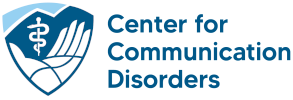We are able to treat preschoolers up to young adults with regard to receptive and expressive language disorders.

Understanding Receptive and Expressive Language
Children must be able to understand language before they can accurately produce language. Receptive language skills include a child’s ability to understand words, phrases, sentences and directions. Expressive language incudes a child’s abilty to use vocabulary words, to know when to use different verb tenses (swim, swam, is swimming) , how to formulate different sentence types such as questions, statements, complicated sentences (e.g. The girl who is laughing is holding my puppy).
Receptive and expressive language services at the CCD include
Children must be able to understand language before they can accurately produce language. Receptive language skills include a child’s ability to understand words, phrases, sentences, and directions. Expressive language incudes a child’s ability to use vocabulary words, to know when to use different verb tenses (swim, swam, is swimming), how to formulate different sentence types such as questions, statements, complicated sentences (e.g. The girl who is laughing is holding my puppy).
• Comprehensive Evaluation of Receptive and Express Language Skills
• Evaluation of Social Language Skills
• Holistic Language Therapy
• Play-Based Language Therapy
• Preschool Language Readiness
• Language-Based Literacy Skills
At a receptive and expressive language appointment, our clinicians will evaluate where your child is developmentally and then devise a therapy plan to help assure your child makes optimal gains in thier skills in order to ensure success in school and set the stage for reading and writing. We are able to treat preschoolers up to young adults with regard to receptive and expressive language disorders. We provide individualized therapy and group therapy.
Aphasia is an acquired language disorder, that commonly results from stoke and traumatic brain injury. Individuals frequently complain that “I know what to say, but I can’t say it”. Many times this is thought of as a “speech disorder”. Individuals with aphasia may have problems speaking, writing, typing, listening, and reading.
Aphasia services at the CCD include individual treatment for persons with aphasia, support. and treatment group. During an aphasia appointment, we will gather information about your medical history and specific complaints related to aphasia. Generally a combination of standardized testing and family/patient reported symptoms are involved in the assessment process. Therapy may consist of addressing verbal communication through a number of methods to make your communication skills more functional, specifically for the activities you want to be involved in.
The summer literacy group is held weekly from June to late July every year. The program is for children entering 2nd-5th grade who need additional support with reading, writing, and/or language skills. The group provides fun, engaging activities and games with peers.
